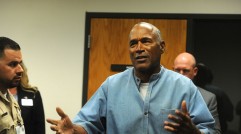Columbus Day 2015: Many American Cities Replace 'Columbus Day' With 'Indigenous People's Day'
The holiday marking the continent's discovery -- "Columbus Day" to most Americans and "Día de la Raza" in many Spanish-speaking nations -- is increasingly being celebrated as "Indigenous Peoples Day" by jurisdictions across the United States.
Many cities are seeking to abolish the traditional holiday and instead acknowledge the millions of people who were already living in the Americas before European colonization, the Washington Post explained. Albuquerque, New Mexico; Anadarko, Oklahoma; Portland, Oregon; St. Paul, Minnesota; and Olympia, Washington have all joined the movement, the newspaper detailed.
Columbus Day, a federal holiday since 1937, has come under more and more scrutiny over the enslavement and genocide of Native Americans that followed Christopher Columbus's arrival in the New World.
South Dakota renamed the holiday as early as 1990, calling it "Native American Day"; the "Indigenous Peoples Day" designation, meanwhile, originated in Berkeley, California, in 1992.
Nick Estes, who helped plan this year's Indigenous Peoples festivities in Albuquerque, told the Associated Press that the new celebration amounts to more than a change in nomenclature for many Native Americans, who make up more than 10 percent of New Mexico's population.
"For the Native community here, Indigenous Peoples Day means a lot. We actually have something," Estes said. "We understand it's just a proclamation, but at the same time, we also understand this is the beginning of something greater," the coordinator added.
Across the Americas, meanwhile, many countries have moved to abolish the controversial "Día de la Raza" designation: In Argentina, the traditional holiday is now celebrated as the "Day of Respect of Cultural Diversity," while Chile has rebranded it as the "Day of the Encounter of the Two Worlds."
But the Italian-American community in particular is trying to defend Columbus Day, as well as the legacy of the Genovese discoverer for whom the holiday is named, the AP noted. Nevertheless, supports such as Anna Vann, a member of the Sons of Italy, have been unable to ignore the controversy surrounding the celebration
"It's been a struggle to even get people to come and attend the parades as spectators. (But) it's a celebration of when the Europeans came over and started their lives here," Vann insisted. "We wouldn't be where we are today if it weren't for this history," she added.
Subscribe to Latin Post!
Sign up for our free newsletter for the Latest coverage!
* This is a contributed article and this content does not necessarily represent the views of latinpost.com














